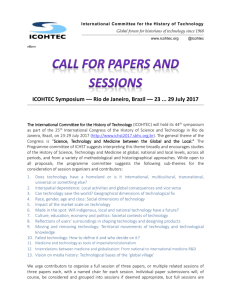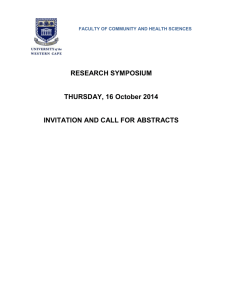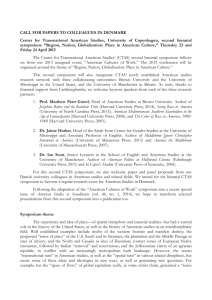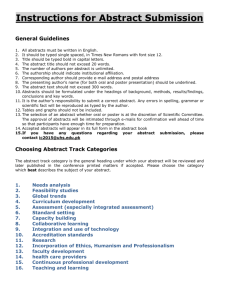AERCcfprtf
advertisement
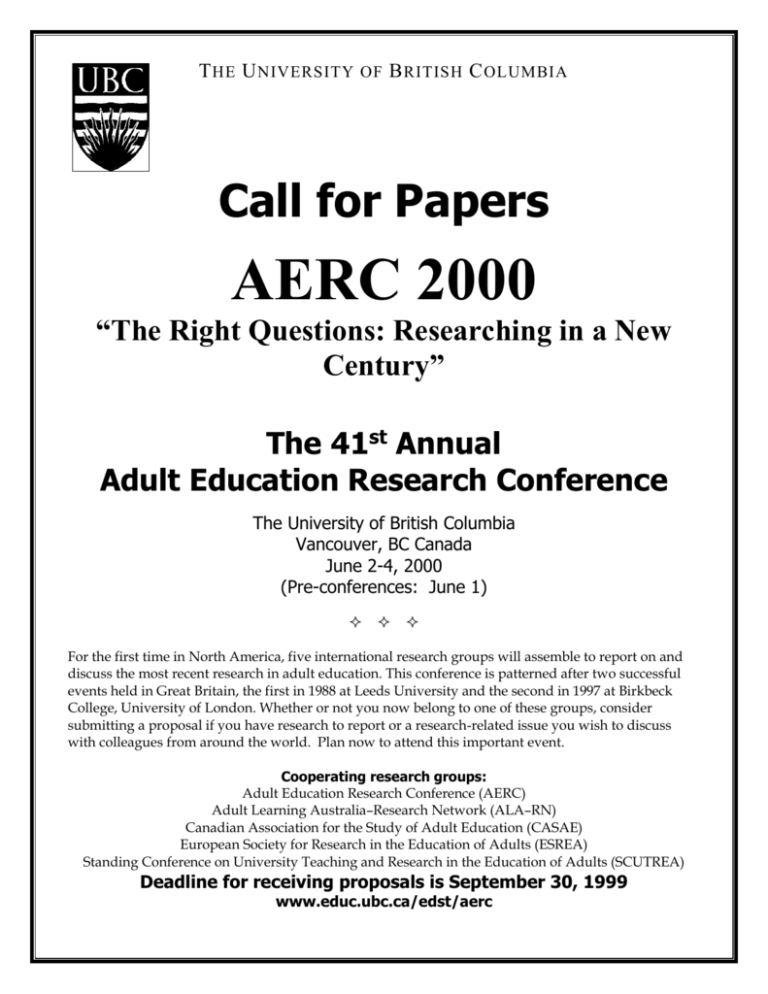
T HE U NIVERSITY OF B RITISH C OLUMBIA Call for Papers AERC 2000 “The Right Questions: Researching in a New Century” The 41st Annual Adult Education Research Conference The University of British Columbia Vancouver, BC Canada June 2-4, 2000 (Pre-conferences: June 1) For the first time in North America, five international research groups will assemble to report on and discuss the most recent research in adult education. This conference is patterned after two successful events held in Great Britain, the first in 1988 at Leeds University and the second in 1997 at Birkbeck College, University of London. Whether or not you now belong to one of these groups, consider submitting a proposal if you have research to report or a research-related issue you wish to discuss with colleagues from around the world. Plan now to attend this important event. Cooperating research groups: Adult Education Research Conference (AERC) Adult Learning Australia–Research Network (ALA–RN) Canadian Association for the Study of Adult Education (CASAE) European Society for Research in the Education of Adults (ESREA) Standing Conference on University Teaching and Research in the Education of Adults (SCUTREA) Deadline for receiving proposals is September 30, 1999 www.educ.ubc.ca/edst/aerc Theme and Types of Proposals The theme of the conference is “The Right Quest/ions: Research/ing in a New Century.” Although there is nothing magical about the year 2000, it affords adult educators an opportunity to reflect on why and how we conduct research and what contributions we can make to a better world. Proposals are invited for papers, research roundtables and symposia on any aspect of adult education. Proposals that address the theme are encouraged but relationship to the theme is not a criterion for acceptance. Paper proposals. Papers are reports of completed research and will be published in the conference proceedings. There are three categories for papers: (a) empirical research, (b) model or theory development, and (c) theorizing from the literature. Submit ONE COPY of a typed cover sheet which includes the paper title, the name, address, phone and fax numbers, and e-mail address of each author, and a signed warrant statement. Submit FIVE COPIES of a typed two-page abstract, not to exceed 1,200 words, which must include, at the top of the first page, the paper title and a statement as to whether the research is completed or the anticipated date of completion. Any paper proposal extending beyond two pages will be excluded. Research roundtable proposals. Research roundtables provide an opportunity to informally discuss completed research, research in progress, and research issues with a small group of conference participants. A two-page summary of each research roundtable will be published in the conference proceedings. Submit ONE COPY of a typed cover sheet which includes the roundtable title, the name, address, phone and fax numbers, and e-mail address of each presenter, and a signed warrant statement. Submit FIVE COPIES of a typed one-page abstract, not to exceed 600 words, which must include, at the top of the page, the roundtable title. Symposium proposals. A symposium presents diverse or conflicting perspectives on a compelling topic or issue that is or should be of concern to adult education researchers. Submit ONE COPY of a typed cover sheet which includes the name, address, phone and fax numbers, and e-mail address of the organizer and each presenter, and a signed warrant statement. Submit FIVE COPIES of a one-page abstract, not to exceed 600 words. An additional halfpage abstract (maximum 300 words) from each presenter should provide details to the onepage symposium abstract. Submit five copies of all abstracts with the symposium title at the top of the first page. Formatting and Submitting Proposals Allow 1” (2.5 cm) margins and use at least 10 pt. type. It is appropriate to provide citations in the text, although given space limitations, it is not necessary to include a reference list. Please, no author names or institutional affiliations in the abstracts. Only one proposal per author may be submitted for review. All proposals must be received by September 30, 1999. Neither faxed nor e-mailed proposals will be accepted. Paper and roundtable proposals should be sent to the receiver of the most appropriate cooperating research group (see addresses on the last page). All symposium proposals should be sent to the AERC receiver, Edward W. Taylor. Warrant Statement for All Proposals “I [we] warrant that if my [our] paper [or roundtable or symposium] proposal is accepted, I [we] will submit a formally written summary for inclusion in the conference proceedings. I [we] agree that the summary will be typed, singlespaced, and ____ pages long [six pages for papers, two pages for roundtables, eight pages for symposia]. I [we] understand that if this summary is not submitted by March 1, 2000, my [our] presentation will not be included as part of AERC 2000.” (Signature)___________________________________ Session Format and Selection Criteria I. Papers The time allotted for each session is 50 minutes. Audience participation, as a principle of adult education, is stressed. Approximately 100 papers will be presented at the conference. Identify your paper as (a) empirical, (b) model or theory development, or (c) theorizing from the literature. Abstracts should be typed as noted in the above instructions. (a) The empirical research paper should adequately describe: Purpose of study: What does it contribute? Perspective or theoretical framework, including relevant literature. Research design (including rationale for choice of methodology, research questions, modes of data collection and analysis). Findings and conclusions. Implications for adult education theory and practice. (b) Papers intended to develop a model or theory should address: What practical or theoretical void will this model or theory fill with respect to adult education? What are your bases for proposing this model or theory (experience, literature, your own empirical research, etc.)? What are the elements of the model or theory and relationships among its elements? What is its relationship to existing theory? (c) Theorizing from the literature These can be either explorations based on literature (reviews and/or critiques) or applications from one field to another which give us new insights about adult education. The following should be addressed in the abstract: What is the purpose of this exploration or application? What fields of study, disciplinary perspectives, or bodies of literature are being analyzed? What are the implications for the development of adult education theory and practice? If your paper is selected for presentation, you will be responsible for submitting a formally written six-page (single-spaced, typed) paper for inclusion in the conference proceedings. Such papers must be received by March 1, 2000. Papers received after this date will not be included in the conference. Authors whose papers are accepted will be notified of the specifications for preparing and submitting papers. II. Research roundtables The time allotted for each session is 50 minutes. Approximately 30 roundtables will be presented at the conference. Several roundtable discussions will take place concurrently in the same room with each presenter assigned to a different table. Roundtables are opportunities to discuss research and research issues informally with interested conference participants. Abstracts should be typed as noted in the above instructions and should describe the purpose of the session, explain why it is important, provide any background information needed for the discussion and pose the questions or issues that will be addressed. Roundtable proposals will be judged based on the importance of the research or issues they address and their potential to generate lively discussion and debate at the conference. If your roundtable proposal is accepted, you will be responsible for submitting a formally written twopage (single-spaced, typed) summary for inclusion in the conference proceedings. This summary must be received by March 1, 2000. Summaries received after this date will not be included in the conference. III. Symposia A symposium is intended to provide an opportunity for examination of specific problems or topics from a variety of perspectives. This purpose is best served when individuals with diverse or conflicting views interact on a topic of sufficient scope and importance. A symposium should not be merely a presentation of a related set of papers. Each symposium will last 90 minutes. Audience participation is encouraged. Approximately 6 symposia will be presented at the conference. It is the responsibility of organizers of symposia to identify topics and presenters. Organizers must have the consent of all participants before submitting the proposal. Organizers not wishing to chair the session must indicate a chairperson. Should unforeseen circumstances prevent a participant from attending, it is the responsibility of the organizer to: (1) find a suitable replacement; and (2) notify the AERC proposal receiver, all other participants, and discussants involved in the session to enable them to have prior access to abstracts of each presentation, so they may formulate their remarks in the context of what the others plan to say. Organizers are urged to encourage such an exchange of information. Only the organizer will be notified of the acceptance of a symposium, and is responsible for notifying other participants. Symposia should address the following: What is the controversial issue or topic being addressed? Why should adult educators care about this matter? What are the competing perspectives (including related bodies of literature) from which this issue will be addressed? On what basis does each panelist hold his/her perspective (experience, literature, one’s own empirical research)? What action plan or policy implications are likely to emerge from this examination? If the symposium abstract is selected, the organizer is responsible for submitting a formally written eight-page (single-spaced, typed) paper for inclusion in the conference proceedings. Such papers must be received by March 1, 2000, or the symposium will not be included in the conference. Cooperating Research Groups AERC (The Americas and others not listed below) Edward W. Taylor, Associate Professor PennState Capital College School of Behavioral Sciences and Education W153 Olmsted Building 777 W. Harrisburg Pike Middletown, PA 17057 USA E-mail: ed_taylor@cloud.seattleantioch.edu ALA–RN (Australia, New Zealand, Southeast Asian and Pacific nations) Associate Professor Griff Foley Adult Education Program Faculty of Education Haymarket Campus University of Technology, Sydney PO Box 123, Broadway NSW 2007 AUSTRALIA Phone: (612) 9514 3908 E-mail: Griff.Foley@uts.edu.au CASAE (Canada) Tom Nesbit, Director Centre for Labour Studies Simon Fraser University Continuing Studies 8888 University Drive Burnaby, BC V5A 1S6 CANADA Phone: (604) 291-4177 E-mail: tnesbit@sfu.ca ESREA (All European countries) Professor Richard Taylor, Director Continuing Education Development School of Continuing Education University of Leeds Leeds LS2 9JT UNITED KINGDOM Phone: (+44) 113 233 3180 E-mail: aedrkst@leeds.ac.uk SCUTREA (Great Britain) Miriam Zukas, Chair School of Continuing Education University of Leeds Leeds LS2 9JT UNITED KINGDOM Phone: (+44) 113 233 3242 E-mail: m.zukas@leeds.ac.uk For questions about local arrangements or to add your name to the mailing list to receive registration materials, please contact: Thomas J. Sork Department of Educational Studies University of British Columbia 2125 Main Mall Vancouver, BC V6T 1Z4 CANADA Phone: (604) 822-5702 E-mail: tom.sork@ubc.ca For more information, visit the AERC web site: www.educ.ubc.ca/edst/aerc

